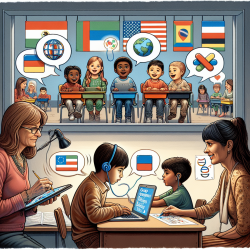Introduction
As speech-language pathologists, we are dedicated to fostering the best outcomes for children. Understanding the broader context in which our young clients live can greatly enhance our practice. A recent study titled "The effect of food insecurity and stress on delay discounting across families: a COVID-19 natural experiment" offers valuable insights into how external factors like food insecurity and stress can impact children's development, specifically in decision-making processes such as delay discounting.
Key Findings from the Research
The study, conducted during the COVID-19 pandemic, examined how food insecurity and psychological stress affected delay discounting among parents, adolescents, and children. Delay discounting is the tendency to prioritize smaller, immediate rewards over larger, delayed ones, which can influence decision-making and self-regulation.
Key findings include:
- Pandemic food insecurity was linked to increased stress among parents, but not directly with delay discounting.
- Children exhibited greater delay discounting when experiencing increased stress during the pandemic, whereas adolescents and parents did not show significant changes.
- Childhood may be a critical period for the impact of stress on delay discounting, suggesting that interventions during this time could be particularly beneficial.
Implications for Speech Language Pathologists
These findings have several implications for our practice:
- Holistic Assessment: Consider the broader socio-economic context of the families you work with. Understanding factors like food insecurity and stress can provide a more comprehensive view of a child's challenges and needs.
- Targeted Interventions: Focus on developing self-regulation and decision-making skills in children, especially those from food-insecure households. Techniques that promote future-oriented thinking and self-control could be integrated into therapy sessions.
- Collaboration with Families: Engage with parents to address stressors that may affect their children's development. Providing resources or referrals to support services can be an integral part of your role.
Encouraging Further Research
The study highlights the need for continued research into how environmental factors like stress and food insecurity impact developmental trajectories. As practitioners, staying informed about ongoing research and contributing to the body of knowledge through case studies or collaborations can enhance our understanding and effectiveness.
Conclusion
By integrating these insights into our practice, we can better support children in developing crucial life skills. Understanding the interplay between stress, food insecurity, and developmental outcomes allows us to tailor our approaches to the unique needs of each child.
To read the original research paper, please follow this link: The effect of food insecurity and stress on delay discounting across families: a COVID-19 natural experiment.










